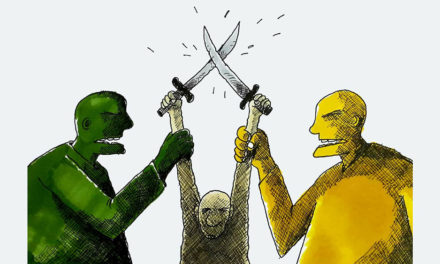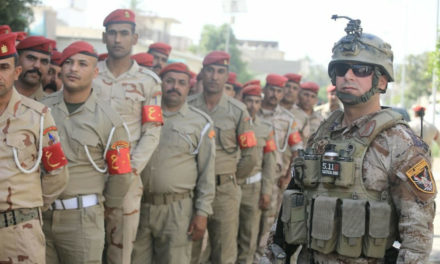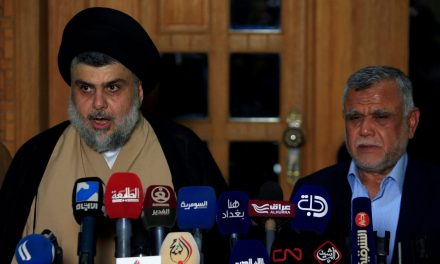The incumbent president of the Kurdistan Region of Iraq, Masoud Barzani visited Baghdad for the first time in three years on September 29, 2016. Having visited Ankara four times during Haidar al-Abadi’s premiership, the visit to the Iraqi capital comes at a very desperate time for Barzani whose trips to Baghdad are generally reserved for his nephew Nichervan Barzani, the prime minister of the Kurdistan Region.
Political divisions between the federal government of Iraq and the Kurdistan Regional Government (KRG) are not new and have not stopped Barzani from pursuing his own agenda of empowering himself using turkey to the extent of becoming a client state of Turkey while distancing himself from Baghdad. The war of words with Iraqi leaders has not shaken his rule in the Kurdistan Region. However, this has only been the case as Barzani has been able to keep other Kurdish political parties onboard. Despite their differences and history of civil war in the 1990s, Kurdish parties formed a Kurdish Alliance in the first free Iraqi elections in 2005 and have been able to maintain Kurdish unity in the face of any conflicting issues with the federal government of Iraq.
The Kurdish Alliance began deteriorating in the past few years. These divisions were first noticeable during the 2014 federal elections when the Kurdish parties ran separately outside the Kurdistan Region, where they normally ran as one political coalition. More recently, the Kurdistan Alliance split in the Iraqi parliament where members of parliament from Barzani’s Kurdistan Democratic Party (KDP) became its own political block and their Kurdish counterparts the Patriotic Union of Kurdistan (PUK) and Gorran Party (Movement for Change) become another. The split was addressed on political talk shows by Ala Talabani, the head of the PUK and Gorran block in Baghdad and became clear in the sacking of Iraqi finance minister and KDP senior leader Hoshyar Zebari in a vote of no confidence by the Iraqi parliament where PUK and Gorran voted with the majority of other Iraqi parties in withdrawing confidence in Zebari.
Hoshyar Zebari is the uncle of Masoud Barzani and has been the KDP’s man in Baghdad since the fall of Saddam Hussain in 2003. Up until his sacking by the Iraqi parliament in a vote of no-confidence, Zebari was the only politician to serve as a minister in every Iraqi administration post-Saddam. He was minister of foreign affairs for ten years before taking up the post of finance minister under prime minister Haider al-Abadi. His dismissal served a huge blow to Barzani, forcing him to come to Baghdad.
Barzani has been able to withstand divisions with Baghdad, but a split within the Kurdistan Region itself allowing the PUK and Gorran to form an agreement backed by powerful Iraqi leaders such as former Iraqi prime minister, Nouri al-Maliki, has forced Barzani to come to Baghdad and build an alliance of his own. For that reason Gorran did not take part in Barzani’s delegation to Baghdad and Gorran member of parliament, Hoshyar Abdulla, claimed Barzani was only representing himself and his party on this visit and not the Kurdish people. As for the PUK, their party is facing a split within and the half led by Kosrat Rasul and Barham Salih, more aligned with the KDP, saw Rasul accompany Barzani to Baghdad, where the other half of the party led by Hero Ibrahim held their position with Gorran in dismissing Barzani’s visit.
There was little prime minister Abadi publicly addressed on political divisions in the Kurdistan Region but spoke in general unifying terms. Abadi stated it is the duty of all parties to work together to serve all Iraqis whether they are political parties from the Kurdistan Region or Baghdad. Abadi pushed the language of federalism throughout his address to Barzani, his delegation and the accompanying Iraqi political leaders. Abadi constantly referred to himself as the leader of all federal Iraq. A key point Abadi touched upon at the end was decentralization and explained in clear terms that Baghdad is no longer a central government but a federal government.
These were welcoming words for Barzani who needs Abadi more than ever as both are facing a threat from Maliki. Maliki has been able to form a strong attack on Abadi’s government by sacking the minister of defense and minister of finance; the minister of finance being Barzani’s uncle and minister of defense being Khalid al-Obeidi, a member of KDP’s allied political party Mutahidoon from Mosul. Both former ministers have sent appeals to the federal courts to overturn the vote of no confidence. Barzani had little to say to the Iraqi public other than downplay his statements towards Kurdish independence and pledge full support to prime minister Abadi and his government.
As for the Kurdish public, Masoud Barzani claimed before departing Baghdad that he and Abadi had reached an understanding on oil and gas laws and the economic crisis facing the country as a whole. There were no specifics given as there was no formal deal reached, but Barzani reassured that discussions will continue to take place after he returns from Baghdad. There will be increased pressure for results to be seen as PUK members from Hero Ibrahim’s wing have already hinted that this could be the last straw for Barzani’s presidency if he is unable to deliver on his promises to the Kurdish people before leaving for Baghdad.
Not only Kurds, but all Iraqis will be watching closely as to how Baghdad and KRG’s relationship shape up in the upcoming weeks as the military operation to liberate Mosul nears. The command for the military operation is in Erbil and has required the cooperation of both the KRG and Baghdad, something Abadi touched on extensively as well. Abadi emphasized the role of the Iraqi Security Forces will play, the supportive role of the Peshmerga forces, and the necessary cooperation required between the two sides after Mosul is liberated.
Despite the authoritarian rule of Masoud Barzani and the divisions between the KRG and the federal government in Baghdad in the past thirteen years, it has become as clear as ever that the KRG is at its weakest point since its establishment in 1992 and the prospect of splitting from Iraq is highly unlikely. In addition, the terrorist group the Islamic State of Iraq and the Levant (ISIL) will be eliminated from Iraq once Mosul is liberated, meaning federal Iraq is not going anywhere anytime soon. The fact Iraq has been able to survive near-brink collapse when Mosul fell to ISIL in June of 2014 leaves an unlikely scenario for Iraq to ever collapse and divide – the more reason for all sides to work together and build a true federal state. Abadi showed his willingness to cooperate with the Kurdish delegation, it is now time for Barzani and Kurdish delegation to reciprocate with action.

Hamzeh Hadad
Hamzeh Hadad is an Iraqi writer and commentator. He holds a Bachelor of Arts with honours from the University of King’s College.










